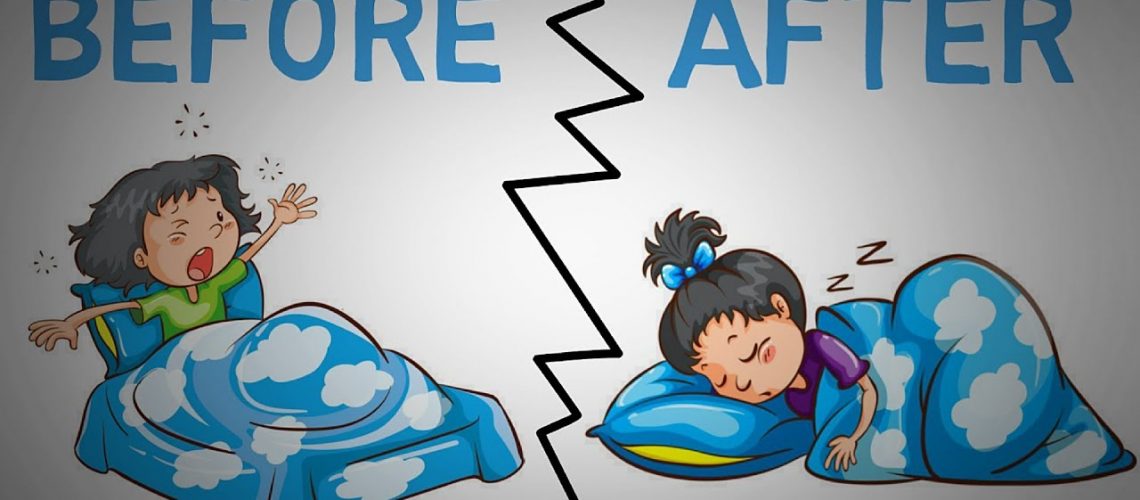In this video, learn five easy methods that will help you fall asleep under five minutes — instead of tossing and turning for an hour.
Video by Better Than Yesterday
Key Takeaways
1. Use your Bed for Sleep Only
Lots of people like to browse their phones, play games or do work on their laptop while in bed. But it’s important to only use your bed for sleep.
This is because your brain can form a strong link between being in bed and being asleep. Doing anything else in your bed but sleeping teaches your brain that your bed is for other things as well.
- If you use your bed to watch TV, your brain will start to associate your bed with that activity. If you eat food in bed, your brain will connect it with hunger.
- Guess what happens if you use your bed only for sleep. That’s right! Your brain will start associating your bed with ONLY sleep and it will become a subconscious habit to prepare you for the dreamworld.
- However it does take some time for your brain to make this shift, so it won’t work overnight. But if you stick with it, the payoff is huge.
This is why it’s so important to stay away from your bed, if you’re not planning on sleeping, and only get in when you’re ready for slumber.
2. Limit Caffeine
Caffeine has its benefits, but it also has a downside.
- For example, coffee. It’s perfectly fine to have it once or twice a day. The problem is when you drink this caffeinated drink 6 times a day and the last cup is with dinner at night.
Caffeine doesn’t give you energy in a way most people believe.
What it actually does is, it blocks a neurotransmitter in your brain called “Adenosine”. This neurotransmitter is what signals your body that it’s time to relax or go to sleep.
- When you drink coffee and get that caffeine hit, it blocks the Adenosine receptors and you don’t feel as tired. This means that even if your brain and body are tired, caffeine will still keep you wide awake.
- Caffeine has a half-life of around 5 to 8 hours depending on your biochemical makeup. Half-life essentially means that after a specific amount of time (in this case, 8 hours), half of the substance is still active in your system.
- So if you consumed 200 milligrams of caffeine (which is around one or two cups of coffee), after eight hours you’d have 100 milligrams. And after another 8 hours, 50 milligrams and so on.. This is why having caffeine even 6 hours before bedtime causes disturbances in your sleep.
What you should do is set a specific time in your day when you stop consuming caffeine altogether. This way you make sure your body has time to remove the majority of it from your system before bedtime.
- For most people, that’s generally going to be before 2pm.
3. Go to Sleep at the Same Time Every Night
You should head to bed around the same time every single day.
- According to several studies, going to sleep on a regular schedule will cut down on the amount of time you spend tossing and turning by a huge amount. This is because you will naturally start feeling tired at the same time every night.
A sleep routine helps your body release hormones at the right time to make you feel sleepy—specifically the sleep hormone called Melatonin, which regulates sleep and wakefulness.
- If your schedule is inconsistent your Melatonin production gets all messed up and you won’t feel sleepy until late hours.
4. Calm Your Inner Voice
When we’re stressed or overly worried, our minds race with thoughts instead of shutting down at night, which leaves our brain hyperactive and we stay wide awake.
So you may want to look at what’s going on in your life, that’s giving you stress and see if you can do something about that.
- If you don’t know how to meditate you should check out the Learn More About Meditation Section.
- If specific exercises aren’t your thing,
try breathing deeply and slowly through your nose. This is one of the ways athletes calm down before their performance.
5. Avoid the Light
Our sleep is highly tied with hormone Melatonin. One of the ways this hormone is affected, is by the light that hits your skin and eyes.
Back in the days, sun was pretty much our only source of light. Now the problem is that our body mistakes any kind of artificial light for sunlight.
This is why too much artificial light in the evening will negatively impact your Melatonin production, making it much harder to fall asleep, since your body will think it’s still daytime.
- We can combat this issue by avoiding any screen time and use weaker indoor lightning, at least 1 hour before bed.
- That means no TV, no smart phones and no computer screens prior to sleep.
- Some good options are: solving puzzles or crosswords, journaling, sitting and listening to music or just thinking.
- None of these activities are as stimulating as browsing through your phone or watching TV, so you’ll find yourself feeling sleepy in no time.

